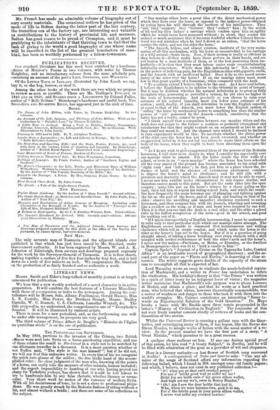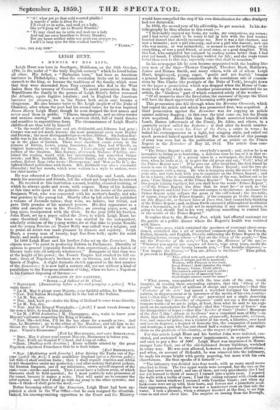LITERARY NEWS.
Messrs. Smith and Elder's long-talked-of monthly journal is at length announced for publication.
We hear that a new Weekly periodical of a novel character is in active preparation. It will combine the best features of a Literary Miscellany with those of a companion or index to the newspapers. Among the con- tributors will be Messrs. Sala, Albany, Fonblanque, Gerald Massey, Miss L. S. Costello, Miss Power, the Brothers /trough, Messrs. Dudley Costello, W. C. Bennett, C. S. Cheltnasn, Lascelles Wraxall, &c. The title proposed is, we understand, the comprehensive one of " Everybody's Journal." It will be illustrated by eminent artists. There is room for a new periodical, and, as the forthcoming one will be under able management, its prospects are very good.
The third volume of Prince Albert de Broglie's " Histoire de l'Eglise an quatriame Bieck " is on the eve of publication.
THE PERIODICALS TOR SEPTEMBER.
In May 1864, previous to the invasion of the Crimea, two British officers were sent into Syria on a horse-purchasing expedition, and one of them relates the result in Blackwood in a style not to be matched by one dilettante traveller in a thousand. It is a moot question whether or not Buffon said, " The style is the man himself "; but if he did not, we will say it of this unknown writer. In every line of his we recognise the quick sure glance of the soldier; the fine bridle hand of the accom- plished rider ; the clear judgment of the man who, knowing all the points of a horse, can easily take the measure of other animals, human included ; and the superb impassibility to humbug of one who having proved too sharp for Yorkshire jockeys, has shown that it would be lost labour to try to bamboozle him by any false rhetoric, whether literary or verna- cular. Very short work he makes of the romance of modern Syria. With all his decisiveness of tone, he is not a slave to professional preju- dices. Ire was greatly struck by the Bedouin fashion of riding without a bit, and almost without a bridle ; and these are some of his reflections on the subject. " Our manage riders have a great idea of the direct mechanical power which they have over the horse, as opposed to the indirect power obtained by acting upon his will through the medium of his intelligence. They ' aid,' they support,' they ' balance,' they collect' him ; by the action of bit and leg they induce a carriage which confers upon him an agility which he would never have possessed without ; in short, they render the animal so much assistance that it becomes doubtful whether Colonel Green- wood was not mistaken when he laid it down as an axiom, that the horse carries the rider, and not the rider the horse.' " The Anazeh, hitless, and almost reinless, destitute of the very main- spring of all this mechanism, with his horse as uncontrolled in his carriage as a wild animal—beats them. Now, if their system is really as efficient as they believe it—if they really have these powers in their hands, and are yet beaten by a man destitute of them, or at the best possessing them im- perfectly—it is clear that they must labour under some counterbalancing inferionty somewhere. Where does this inferiority lie ? Not, certainly, in the power of inflicting pain, for the Englishman rides with gigantic curbs, and the Anazeh with an inefficient halter. Does it lie in the moral ascen- dancy of the rider over the horse ? If so, our manage riders must stand low in that great quality of a horseman, when compared with the Arab. " To a certain extent I believe this to be the case. As I have said before, I believe the Englishman to be inferior to the Oriental in point of temper. But it may be doubted whether his natural inferiority is so great as fully to explain why, possessing so powerful a system, he yet rises no higher in the scale of horsemanship. And precisely as you choose to raise your estimate of his natural capacity, must you lower your estimate of his system ; until, finally, if you shall determine to rate the English capacity as equal to that of the Anazeh, you must lower the English system of aiding' the horse by mechanical power to something less than the similar powers of aid' possessed by the Anazeh—which, considering that the latter has not a bridle, cannot be great. " I think myself that a comparison between our manage riders and the Arab does not assign to the former a position so perfectly triumphant and satisfactory but that they might venture on an experiment or two to see if they could not mend it. And the channel into which I should be inclined to turn experiment would be this: To ascertain whether the direct power of the rider over the horse has not been much overrated, and whether an exaggerated belief in it has not led our riders to waste their efforts on the body of the horse, when they ought to have been directing them upon the mind.
" As I do not wish to give exaggerated ideas of the powers of the Bedouin horseman, I will state more clearly in what I consider his superiority over our manage rider to consist. Put the latter inside the four walls of a school, or even in an " open manage " where the horse has been schooled till the very aspect of the ground has become associated in his mind with right turn' and ' left turn' ; in fact, put him in a place where the in- fluence of habit and the absence of extraneous excitement combine to dispose the horse's mind to obedience ; and he will ride with a precision and dexterity which the Anazeh may or may not be able to equal. I never saw him exhibit under circumstances in any degree similar, and therefore cannot speak to this point. But get the same rider into the open country ; make him put up his horse's temper by a sharp gallop on the turf; then tell him to repeat his riding-school feats, and watch the result. See how frequently the scene becomes one of plunging and fighting against the bit on the part of the horse, and of pulling and hauling on that of the rider : observe the unwilling and imperfect obedience rendered to such a horseman, and then compare him with the Anazeh, wheeling and sweeping like a swallow on the wing, as if man and beast were inspired by one will. Then it is that you see that the Arab is a real rider, and the other a school rider in the fullest acceptation of the term—good in the school, and good for nothing out of it. "If I speak disrespectfully of English horsemanship, I must be understood to refer only to that particular style which our mange riders attempt. The Englishman seems unable to command that instantaneous and willing obedience which tell in single combat, and which make the horse to the rider as the boxer's legs are to the boxer. But if it is a question of going straight ahead, of taking a horse headlong over every obstacle with a skill mingled with perfect recklessness of both the rider's neck and the horse's, I never saw the nation—Parthians, or Medea, or Elamites, or the dwellers in Messopotamia—that was fit to hold a candle to him. "
Captain Spoke's "Journal of a Cruise on the Taganyika Lake, Central Africa " is an invaluable record of geographical discovery ; and the se- cond part of the paper on " Fleets and Navies," is deserving of close at- tention. The writer suggests grave doubts of the capacity of the steam ram to accomplish all that is expected of her.
Lord Macaulay wrote an essay to vindicate the much-befouled reputa- tion of Machiavelli, and a writer in Fraser has undertaken to refute the vindication. His lordship's theory is that " the Prince " was written in a spirit of bitter irony by an indignant lover of virtue ; the magazine writer maintains that Machiavelli's sole purpose was to please Lorenzo di Mediei, and obtain a place ; and that be wrote as a hard practical man, who believed that virtue, however theoretically commendable, was a source of weakness and danger to those who took it with them into the world's struggles. Mr. Cairns contributes an interesting "Essay to- wards an Experimental Solution of the Gold Question." Dr. Mayo breaks a lance with Mr. Buckle upon three tenets propounded in the latter's "History of Civilization in England." The remainder of this not very lively number consists chiefly of reviews of books and the con- tinuations of two stories.
Whilst the Universal Review is running a gallant race with the Quar- terlies, and outstripping many of them, it has begun, like the Revue des Dieux Mendes, to mingle works of fiction with the usual matter of a re- view. In the present number we have the flint part of a story, " A Great Mistake," which promises to be a great success.
A quelguc chose malheur est bon. If any one desires special proof of this axiom, let him read " A Gouty Subject," in Bentley, and he will be filled with admiration of the gout as a provoker of wit and eloquence.
Here is a literary curiosity—a lost flower of Scottish song recovered
in Arabia! A correspondent of Notes and Queries asks : " Can any ad-
mirer of the songs of Scotland afford any information regarding the
following ballad, which I found in MS. amongst some old family papers ;
and which, I believe, does not exist in any published collection ?— 0 ! whaZgot ye that auld crooked penny ?
For ane o' bricht goud wad ye niffer wi' me?
Richt fou are baith ends o' my green silken wallet, And high are my wa's, ewer in Bonny Dundee.'
" ' Oh? gin I saw the dear laddie that had it,
Wha, when we were bairnies twa, geid it to me,
For a' the bricht goud in your green silken wallet,
I never wad niffer my crooked bawbee.' " 0 ! whar got ye that auld worsted plaiclie ?
A mantle o' satin is fitter for ye. I'll dead ye in satin, and mak ye a lady, Gin ye'd gang wr me to Bonnie Dundee.'
" 4 Ye may dead me in satin and mak me a lady
And tak me over heartless to Bonne- Dundee, But my heart neither satin nor good can procure ye, I sell't it lang sync for this crooked bawbee.' "
" Aden, 10th July 1859."



























 Previous page
Previous page